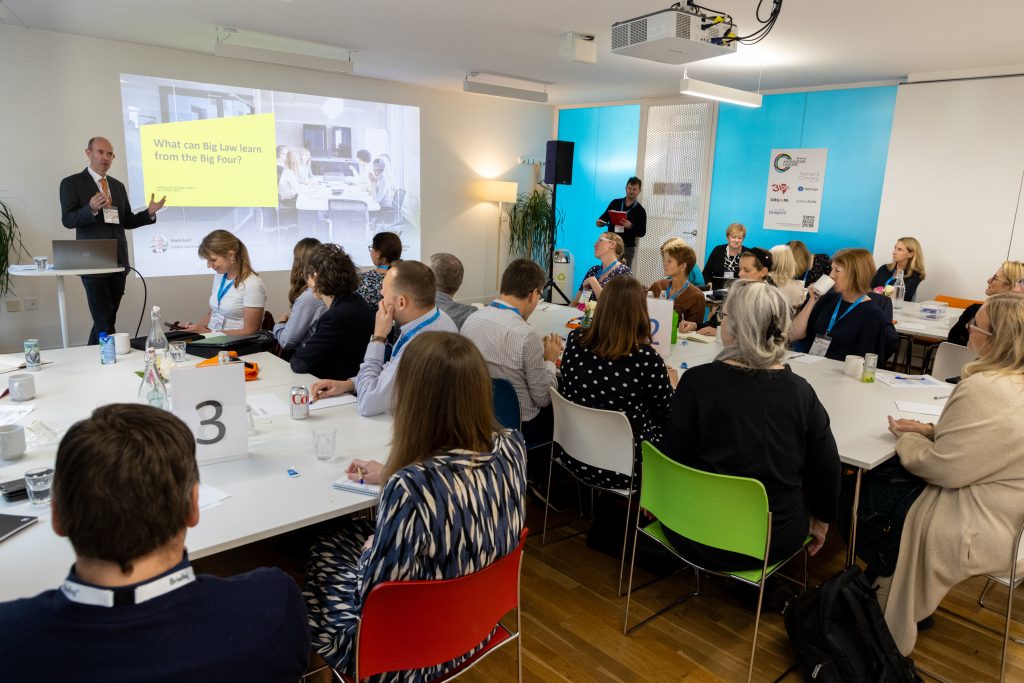THE GENAI RACE is on — and knowledge must be in shape
At October’s main event — Briefing Knowledge Leaders 2023 — our established collaborative idea-exchanging and problem-solving sessions were peppered with several short, sharp presentations to help provoke the most productive discussion.
I was particularly pleased to welcome back Mark Ford, who was appointed global law knowledge leader at EY back in early 2022.
He reminded us of some of the key differences working as a legal professional in such an organisation — that much of the work is really ‘run the company’ rather than so-called ‘bet the company’, for example. But that’s a hell of a lot of running. Legal is not viewed as the heroes parachuted in to solve your problems in such an exercise. The Big Four are in the business of building multi-touchpoint, transformative solutions — in which legal must of course play its particular role to a very high standard. But the expectation is that lawyers will follow the same tried-and-tested processes as others — and yes, adopt established, widely used technology.
I was not aware, however, that in September EY ploughed a whopping $1.4bn into new platform EY.ai and a large language model on the way called EY.ai EYQ. This work includes alliances with the likes of Microsoft, SAP, Dell, ServiceNow and Thomson Reuters — in the case of the latter to provide ways of merging insights spanning tax, law, trade, and intensifying environmental, social and governance (ESG) matters.
Global chairman and CEO Carmine Di Sibio said in the release: “AI’s moment is now. Every business is considering how it will be integrated into operations and its impact on the future. However, the adoption of AI is more than a technology challenge. That’s why EY teams help clients identify how to capture the transformative power of AI from every seat at the boardroom table and across the enterprise. It’s about unlocking new economic value responsibly to realise the vast potential of this technological evolution.”
So generative AI (genAI) is out of the bottle — and its future territory in legal was also a topic to generate plenty of discussion when our knowledge leader guests came together to exchange their perspectives on a range of common priorities or pain points. These closed-room conversations were facilitated by our Knowledge Leaders 2023 partners 3Kites, Fireman & Company, iManage, Orgaimi, SearchFlow and Tiger Eye — each an expert in its field.
As an example, one table heard there’s likely plenty of investigation required as to whether KM talent development plans ought to lean towards that talent becoming more ‘specialised’ or more ‘versatile’. Although an expanding range of areas coming within the knowledge ambit in recent years — skills development, tech, pricing, and so on — has seen an increase in specialisation, it was argued that it would help all to have enough versatility in the round to pivot or capitalise on the changing landscape as required. GenAI is a clear case in point – it’s poised to bring significant value to the KM effort in terms of breaking down some long-preserved data silos and setting up new structures. Does this lend weight to the idea of building a KM human who can themselves add value across knowledge, marketing, and perhaps even coding to some extent?
Another suggested that the onboarding of genAI should really, finally put an end to all the back and forth through the pandemic period about whether knowledge and innovation belong together to get a law firm’s innovation strategy to fly. Simply put, it’s knowledge that brings the context of where within the firm any investment in AI ought to be pointed to get the most out of it. It must certainly have a valued seat on that AI strategy steering group — and maybe there’s also an opportunity for knowledge to shine among the assembly of human talents here “as gatekeepers of good marked-up content” for AI to get to work on.
Indeed, specialised and/or versatile, knowledge teams should themselves be one of the early beneficiaries of development in the space through initial identification and delivery of some significant internal efficiencies. Distilling meeting transcriptions into reliable action points was one example given — or a transaction review into an effective summary to feed the KM system for future reference. Early demonstrable wins for working more productively should in turn build greater interest, awareness, buy-in and positive horizon-scanning for further opportunities.
There may still be some appetite for manoeuvres in the field of law firm innovation to experiment hard and ‘fail fast’ in the process. As we saw in the picture from NatWest Markets economist Ross Walker, however —with a flatlining UK economy at best expected into 2024, and business investment still barely above 2016 levels, the pressure will surely be on to ensure any potentially game-changing technology that does get the green light truly delivers some tangible, productivity-boosting organisational improvement. Knowledge is ideally placed to prove that out.
Notes from all Briefing Knowledge Leaders 2023 ‘problem pit stops’ and tech transformation-focused roundtables — plus slides from several of the presentations — are available on the event page.



